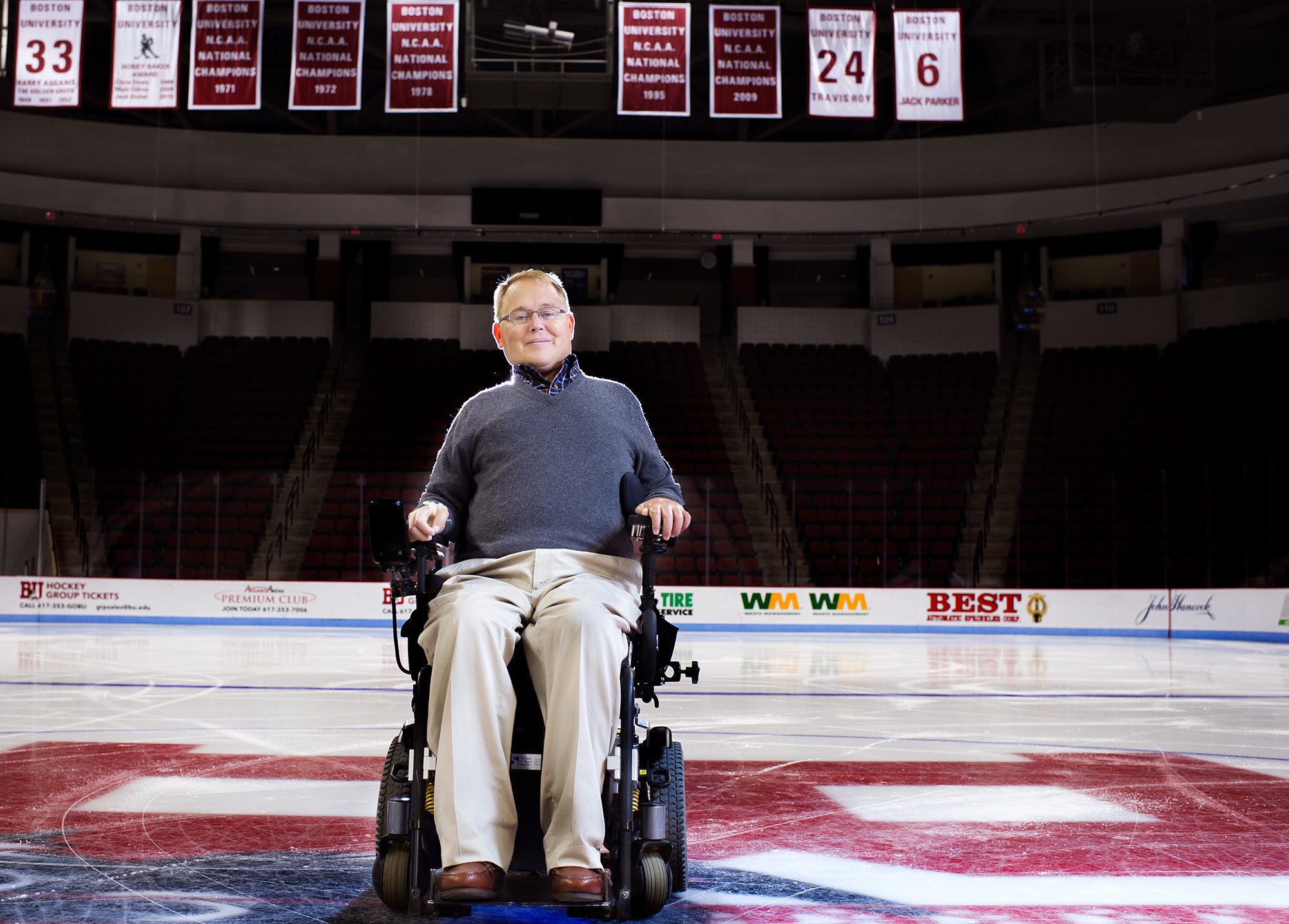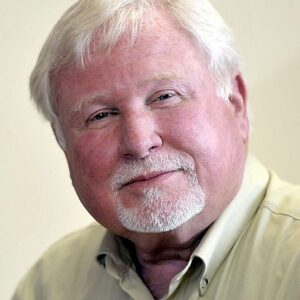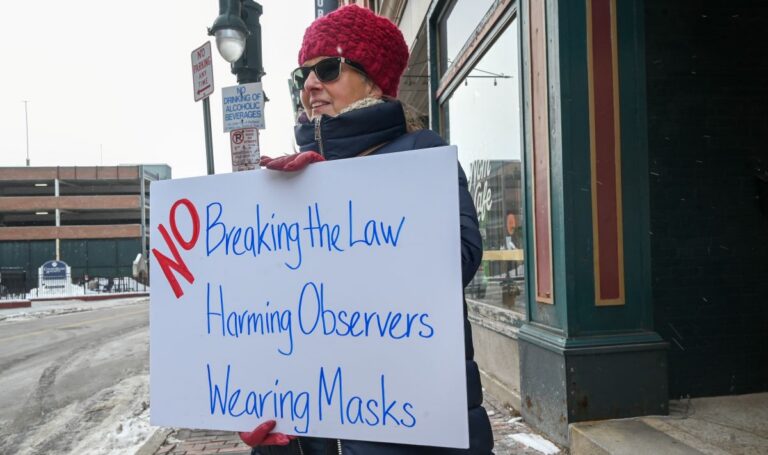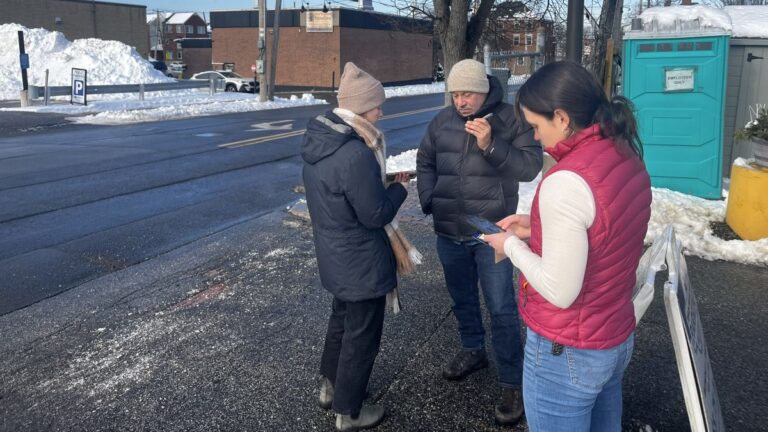Travis Roy glanced back over his shoulder at my indecision. We were crossing Kenmore Square in Boston, hours before a Red Sox game. It was mayhem, as usual.
“Keep up, Steve. Keep up. Follow me.” Over the din created by city traffic feeding into the intersection, I thought I heard Travis laugh that day more than 20 years ago.
Follow me?
Travis died Oct. 29 following surgeries to improve the quality of his life, some 25 years after a hockey injury broke the fourth and fifth vertebrae of his spinal column. He became a quadriplegic, losing virtually all muscle use from his neck down. Travis was only 45.
The injury might have broken his spirit at first but it didn’t touch his heart. Which is why so many tears have been shed and will be shed. In a society that has become so vindictive and full of invective, Travis was the antidote. He cared about others more than himself.

Travis was the kid from Yarmouth with a passion to be the best hockey player. Play for a major college program, maybe make the U.S. Olympic team. Compete in the NHL. Attainable goals. He had checked off the first when he skated onto the ice in a Boston University uniform as a freshman, just months after the Terriers won the national championship.
His injury robbed him of those dreams, 11 seconds into his first shift on the ice. It took some time but he turned his life into a purpose. In his way, Travis became a pathfinder for others. If something dear to you is destroyed, what greater reward is there than giving back to help others whose own dreams died?
The Travis Roy Foundation (TRF) became his reason for getting up in the morning, he once said. The Travis Roy Wiffle Ball Tournament, which started in 2001, became his great joy. Participants, volunteers and spectators crossed a very short one-lane bridge from the real world to a cow pasture in Essex Junction, Vt. transformed into Never Never Land.
Follow me.
Travis and I had arranged to meet that day at the media gate to Fenway Park. He had returned to Boston University after intensive rehabilitation. He wanted to show me his dorm room, which was refitted for his new needs. The dorm was across Kenmore Square.
Sitting in his motorized wheelchair with a red pennant attached to a slender pole maybe eight feet high, Travis worked his joystick with his right hand. It was the only muscle below his neck he could move. A zig here, a zag there and a sudden burst of speed straight ahead.
The kid had learned to navigate city life. He was comfortable on its streets, even if his arms and legs could no longer obey him.
He moved like a water bug on a pond. I felt like the frog in Frogger, one of the original video arcade games where, if you hesitated or made the wrong move, you’d be squished by an oncoming car. Later I realized Travis, maybe unknowingly, had reversed roles and by crossing Kenmore Square pulled me into his world.
Travis had one of his many post-injury transformative moments when he first returned to BU. Few, if any of his fellow students, knew how to react to this blonde, blue-eyed All-American boy in a wheelchair. When he went to a dining hall for the first time with his caregiver — who would help cut his food and fit an adaptable device on his right wrist to assist Travis feeding himself — they ate alone.
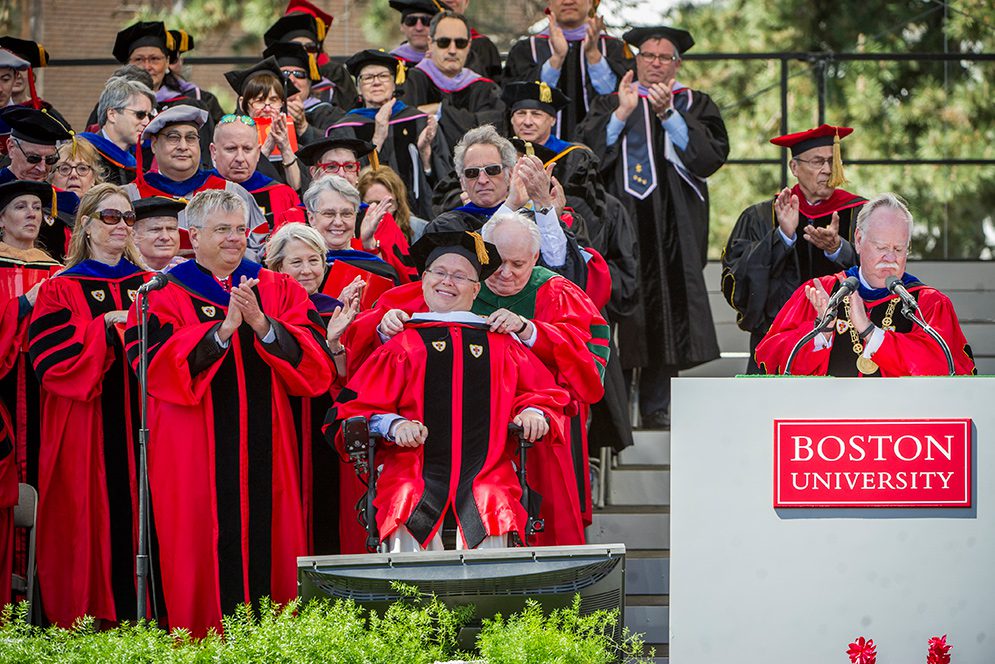
Any school cafeteria or college dining hall buzzes with interactions. BU was no different. But no one approached Travis. Later, he learned, his classmates simply didn’t know how. They knew his story. What could they say? What could they do?
“No one sat down,” said Lee Roy, his father. “How do you open up a conversation with someone in a wheelchair? It’s like getting on an elevator. Everyone makes room but no one makes eye contact. No one talks with each other. For Travis, that was tough. He had become invisible.
“It took a great deal of courage for Travis to start introducing himself. He’d roll up to someone, smile and say, ‘Hi, I’m Travis Roy. What’s your name?’ ”
That’s a social skill taught early in life. But when a life is turned upside-down, simple can seem complicated. Until it isn’t. Travis learned quickly that yes, his classmates wanted to talk with him, help him as needed. They didn’t know how.
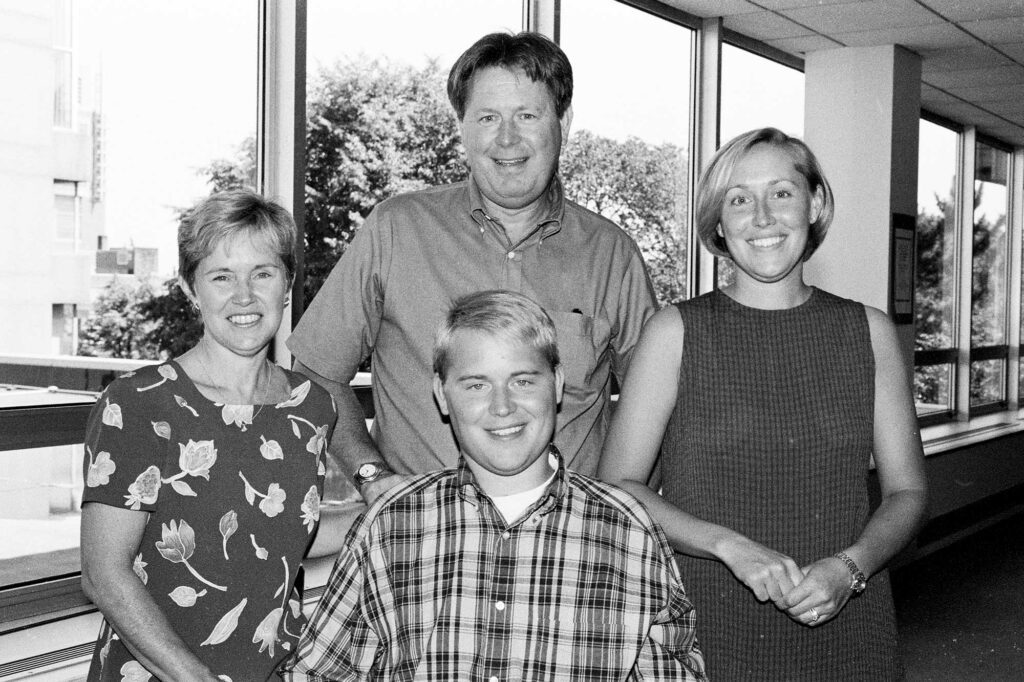
Travis grew up in a loving family that easily brought others into their lives. They believed in honesty, compassion, helping others. They believed in walking in someone’s shoes to understand better. I experienced that as a sports columnist for the Portland Press Herald/Maine Sunday Telegram when the assignment to talk to Lee Roy, two days after his son’s injury, fell to me.
A message was left at the Boston hotel where Lee and Brenda Roy were staying when they weren’t with their son at the hospital. Late Sunday night my phone rang. Lee Roy was calling and before I could say anything, he had a question.
“How did Ricky do today?” Meaning Ricky Craven, the NASCAR driver from Newburgh, Maine, who was in a Sprint Cup race in California that afternoon. Lee Roy was the manager of Craven’s first full-time race team on the New England-based American-Canadian Tour. Travis was the kid sweeping out the race shop, among other duties. He loved hockey but fast cars got his inner motor humming.
Too concerned with Travis and what questions I would ask his father, I paid no attention to the NASCAR race that day and said so. Lee Roy sighed.
“Gosh darn, Solloway, I’ve got a kid in the next room, can’t move a muscle, and all day he’s asking how Ricky did. I told him you wanted to talk to me and you would know where Ricky finished. Now I’ve got to tell him you don’t know.”
I was mortified for two seconds. Or until Lee Roy laughed. Suddenly I understood. Sensing my anxiety in making this call in the first place, he wanted to lighten the mood. Yet give me my first understanding that everything had changed with his family.
Travis did graduate from Boston University in 2000, earning a degree in communications. Not wanting to detract from the other graduates, the Roy family held a press event the day before commencement at the Boston hotel that assisted them when Travis was injured. Lee Roy was surprised to see me at the very casual gathering.
“What, is there a Red Sox game today? Your paper couldn’t have sent you down to cover this. Travis is old news now.”
No, I replied. Travis will never be an old story. He could be my son. Lee and Brenda could be anyone’s parents thrust suddenly into new roles. They all had become examples.
Follow me.

After graduation, Travis became more involved in the Travis Roy Foundation, started in 1996. He was asked to speak to other athletes, students, employees of various companies – anyone who could relate to a message of hope and apply it to their lives. Travis’ message was simple: Everyone can make choices how to live their lives after a loss.
“There are times in our lives when we choose our challenges and other times when the challenges simply choose us. It is what we do in the face of those challenges that defines who we are and more importantly, who we can and will become.”
Those words were his purpose in life after the injury. He also knew money could help find better ways to meet those challenges. Travis and his family understood they were fortunate. His injury, on the night Boston University raised its national championship banner in the Walter Brown Arena on campus, was broadcast on ESPN. Donations poured in from the greater hockey community and from just ordinary folk across the country. An NCAA insurance policy paid for his around-the-clock care.
The Roy family also understood that many others with spinal cord injuries struggled in relative anonymity with the cost of drastically changed lives. How could they pay for the modifications to their homes? Or the mechanical lifts that would enable family members to move those unable to move? Or pay for a more advanced wheelchair? The expenses mount and one financial sacrifice leads to another.
Since it was started, the TRF has given about $8 million to research, said Lee Roy, and another $8 million in assistance grants to about 2,300 spinal cord injury survivors.
In fact, Travis personalized many of those who applied for grants and some whose families were too proud to seek assistance. One summer, on the back deck of his summer cottage in Colchester, Vt., overlooking Lake Champlain, Travis was near tears talking about a young boy named Max, whose family resisted help and even invitations to attend the Travis Roy Wiffle Ball Tournament, a three-day outpouring of love and money.
Max was a paraplegic. Strapped to his car seat when he was about 2 years old, he was involved in an accident caused by a drunk driver. His mother was the driver. Travis was upset as he told the story, saying he had 20 years of a full life. Max only had two.
Travis talked about Garrett Burgess, a high school student who lost the use of his limbs after a car crash. He, too, was a child. In an operation years later related to his paralysis, Burgess lost his eyesight. Travis struggled with his emotions. He could see. His new friend was both a quadriplegic and blind.
The hockey player who lost his dreams with his spinal cord injury said the young man who also lost his sight was his inspiration. That compassion, in a world that has too little of it, is another reason why many people said they felt gutted by Travis’ death.
Burgess, who used Travis as his example, graduated from University of Massachusetts-Lowell, in 2015 with a degree in chemistry and a minor in math.
Follow me.
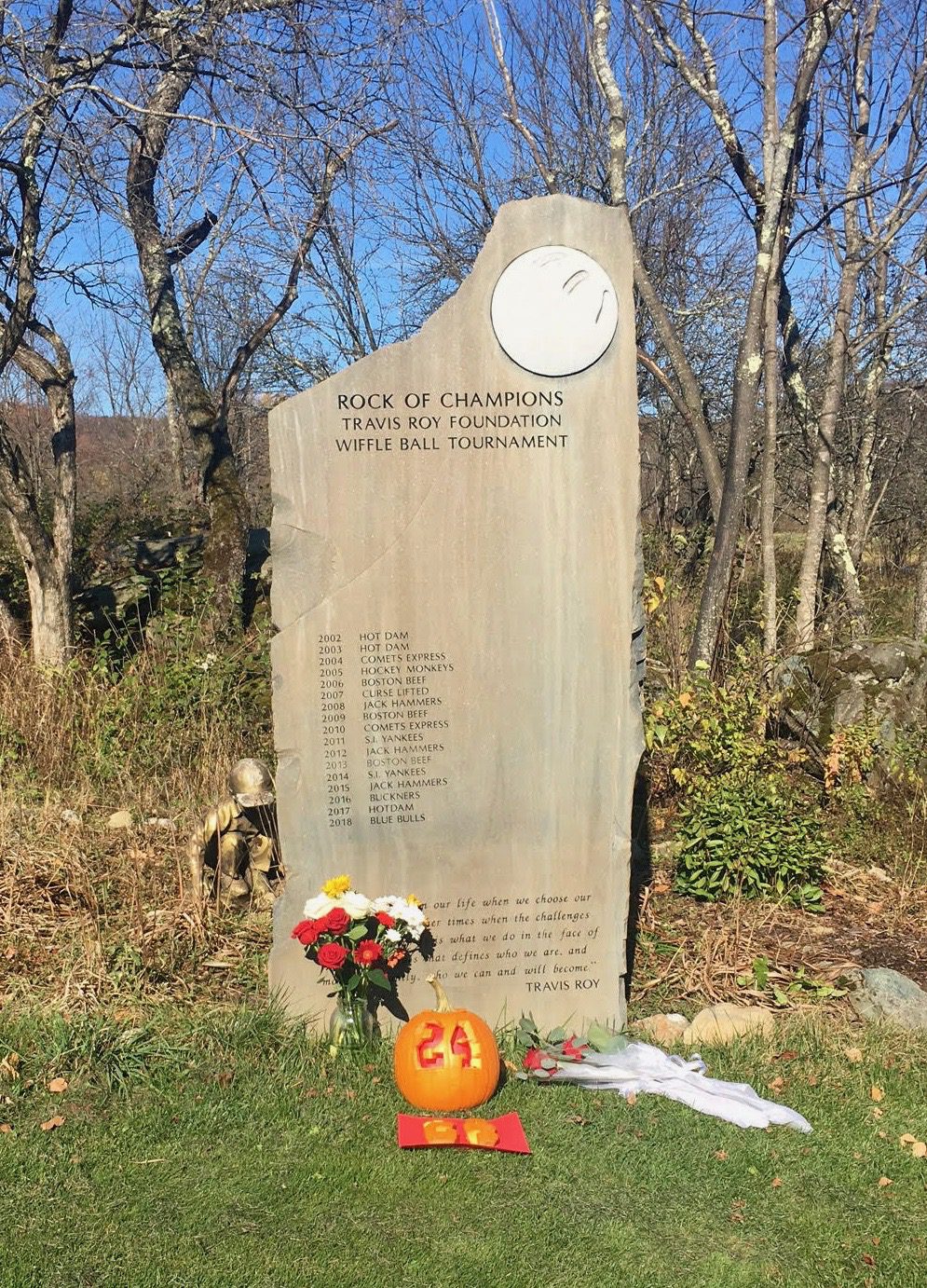
The Travis Roy Wiffle Ball Tournament, played over a three-day weekend each August until this summer’s pandemic, became one of the TRF’s revenue engines. Through 2019, nearly $6 million had been raised, much of it by individual players getting pledges to support the cause.
“It started with seven teams playing in the pouring rain,” said Lee Roy. “It was a one-day event, it was competitive then, we raised $4,000 and everyone had so much fun.”
In 2019, 32 teams played for the opportunity to see their team name carved into a granite slab in a prominent part of a complex that features three fields – Little Fenway, Little Wrigley and Field of Dreams. The scaled-down fields are accurate from the Green Monster to the ivy-covered walls to the corn stalks.
While teams play to win, fun and jokes dominate. Travis, in a motorized wheelchair that adjusted quickly to uneven terrain, scooted between fields. His goal was to meet and thank everyone. By the end of Saturday he was usually exhausted. He would never miss Sunday.
“I don’t think there was anything that meant more to Travis than that tournament,” said Lee Roy. The organizing committee of about 15 people became an extended family. Players, including a younger generation taking over for their fathers, became lasting friends. It’s a reunion of sorts, including a Maine team named Hard Shells, made up of Travis’ childhood friends.
Tony McNaboe may be the soul of the Hard Shells. A former drummer for the Maine band Rustic Overtones and the musician Ray LaMontagne, McNaboe posts videos on his Facebook page, thanking friends for their donations. McNaboe once tried to prepare me for the emotions triggered when, in a break from games, Travis would announce the money count halfway through the tournament and again at the end.
He was right. One August weekend I saw tears rolling down the faces of teenagers, adults and older folk. My eyes started filling. “People wanted to see Travis get out of his wheelchair,” said Lee Roy, trying to explain. And by extension, everyone else suffering from a spinal cord injury.
“There was no tournament this summer,” said Lee Roy. “We decided to have a virtual auction to raise money. If we could raise $50,000, that would be incredible. Then we set the goal at $100,000. After we reached $200,000 we stopped setting the goal. It defied logic. We raised $372,000 when it was over.
“How is that possible for a tournament we didn’t have?”
Travis was a remarkable man who faced his own fears and his own sadness. He lived part of the year in a condo on Commonwealth Avenue in Boston. From a living room window he could see the Citgo sign atop Fenway Park and into the stadium itself.
His summer cottage, near his parents and other relatives, was his happy place. The home was specially built for his needs. “Travis loved rolling out onto the deck bare-chested,” said Lee Roy. “He could feel the sun on his shoulders.”
Travis connected with people and while he was proficient, of course, with social media, he was more effective talking with one person or one thousand. He talked from his heart.
“Travis was the most transparent quadriplegic who rolled the earth,” said Lee Roy. That might not be an overstatement.
Travis once talked to me of not waking up next to a naked woman and feeling her touch. His words were a knife through me. He could joke about not needing to stop a conversation because he had to find a men’s room after a few beers.
Shortly before Travis traveled to New York to accept the Christopher and Dana Reeve Foundation’s Spirit of Courage Award in 2014, we spoke for maybe the last time for a column I would write for the Portland Press Herald. His call came while I was driving south on I-295. I pulled off on an exit and parked.
Had I heard, he asked, of the new clinical trials and a possible breakthrough. I thought he was talking about possibly using his arms or legs again. No, he said, it was about bladder and bowel function, and sexual function.
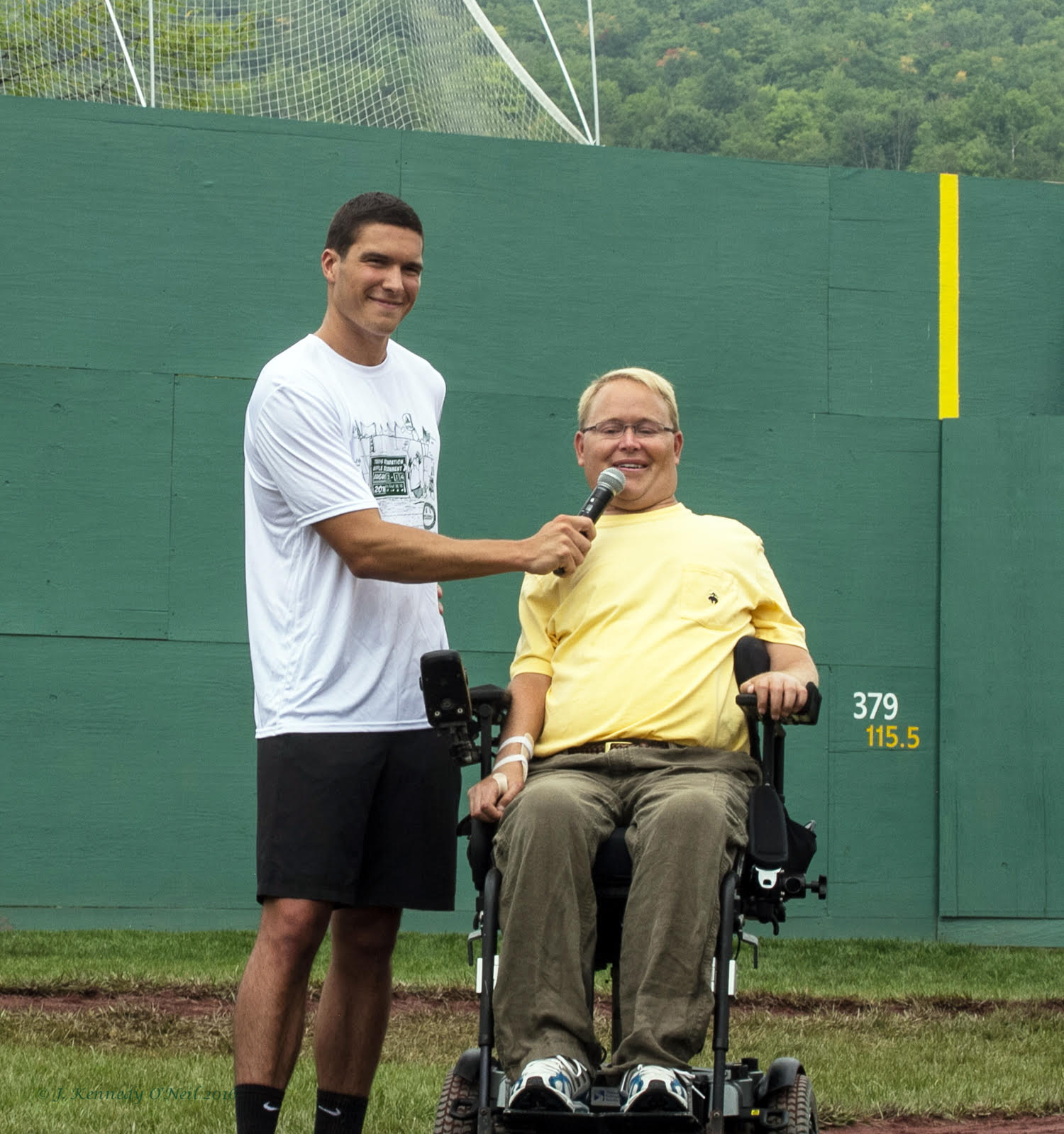
I didn’t know what to say and over a cell phone Travis sensed that. “Steve, you don’t understand. If you haven’t been able to (control or experience those functions) for 19 years, it’s a big deal.”
Days later, at the end of his speech accepting the Reeve Foundation Award, Travis talked about that possible breakthrough and the need for more clinical study funding. He paused and with a bit of impishness in his eyes said:
“You did hear me say the return of sexual function. I was thinking the ladies here tonight might want to get in on this investment.”
After the laughter and applause died down, Travis said he wasn’t a comic and wondered aloud if he was channeling Robin Williams.
About a year later at Christmas, a greeting card came in the mail from Brenda and Lee Roy. Included was a photo from that night in New York with Travis resplendent in a black tux and surrounded by his parents, his sister Tobi and her husband Keith Van Orden, and their three daughters and son. It was a photo of joy and life.
Travis often said his family gave him reason to live. But the man who shouldered the crushed dreams of other spinal cord injury survivors, worried he would become a burden. He understood that quadriplegics especially faced new health issues as they aged.
He never said life in a wheelchair wasn’t difficult.
Late in the afternoon of Oct. 29, my adult son sent me a text. Travis had died.
I texted my son back.
Oh, no.


